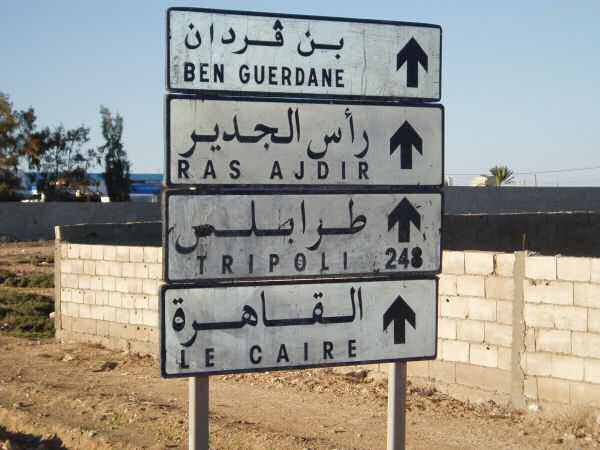The Tripoli based government Joint Task Force seems to have regained control over the Ras Jedir Libyan-Tunisian border crossing yesterday. Several media reports and photographs seem to confirm the news.
The situation at the border crossing seems to be stable with the Joint Task Force reported to be stationed inside and around the crossing.
The Interior Ministry’s electronic inspection and scanning vehicles (Scanners) are reportedly still on the Tunisian side, having been handed over to the Tunisians by Interior Ministry forces before their hasty withdrawal from the attacking local militias.
The Interior Ministry had ordered them to withdraw and avoid bloodshed. It also gave the Tripoli government time to regroup, prepare an overwhelming force, and apply civilian pressure through elders and ethnic leaders.
Reports say the Joint Task Force is preparing the border crossing for the Ministry of Interior re-opening it and to facilitate passenger travel and the flow of goods between the two countries.
No triumphalism
The Abd Alhamid Aldabaiba government seems to be handling the victory with the utmost delicacy. There has been no triumphalism so far in an not effort to offend the local people from Zuwara and the ethnic Amazigh.
Aldabaiba stresses keeping away from political and tribal tensions
In fact, during a meeting with Assistant Chief of Staff of the Army, Salah Al-Namroush, Aldabaiba in his role as Acting Minister of Defence, stressed the need for the work of the Joint Military Force sent to regain control over the border crossing to be ‘‘limited to establishing security’’ at the ‘‘border crossing, away from political and tribal tensions’’.
The role of municipalities
Aldabaiba urged municipalities and notables to support the state’s authority at all border crossings, saying: “The mission of the military force must be limited to establishing security at the crossing, away from any political or tribal tensions.”
A Joint Military Force formed to regain control from local militias
This came after Al-Namroush formed, on March 23, a Joint Military Force from several brigades in the western region to support Ministry of Interior agencies in performing their security duties in the region.
Border crossing closed on 20 March
This follows, it will be recalled, Acting Interior Minister, Emad Trabelsi, closing the Ras Jedir crossing on 20 March, following an armed group’s (local Zuwara-based Amazigh militias) clash with Interior Ministry force charged with securing and protecting the crossing.
Amazigh welcome
The head of the Amazigh Supreme Council of the s of Libya, Al-Hadi Barqiq, commented on the formation of the Joint Force, saying: “The Council appreciates the role of the national military leadership, which blocked the way for those who try to sow discord and ignite the fuse of war.”
Barqiq confirmed that an agreement had been reached between the Zuwara Military Chamber and the Chief of General Staff, to form a Joint Force to secure the border crossing, warning that “any intervention by military forces that are not within the concluded agreement will lead to negative results.”
The ethnic dimension?
It will be recalled that some sectors in the Amazigh community had wanted to politicise and even ethicise the move to take control of the border crossing. They especially wanted to play on the fact that the Acting Interior Minister is from Zintan – a city noted historically for smuggling. They sought to portray the move as a tribal move – away from the Amazigh to the Arabs of Zintan. But, it seems, there was no widespread appetite to wage an ethnic war and reason prevailed.
Why does the Tripoli government want to control the Tunisian border crossing?
It will be recalled that the declared rationale by the Tripoli government for controlling the main Libyan Tunisian land border crossing was to combat smuggling.
What next?
Today, the Interior Ministry reported that the Head of the Joint Security Room at the Ministry of Interior, Abdel Hakim Al-Khaitouni, discussed in a meeting with his assistant Ali Al-Jabri and members of the room, combating illegal immigration, the smuggling of fuel, drugs and goods, and supporting the security directorates from Sabratha to the Tunisian border to establish security and order in the border region.
Analysis: Ras Jedir could act as a platform for further state-building success?
The victory by the state, represented by the Tripoli based Libyan government, in regaining control over its main land border crossing with Tunisia, is hugely symbolic. It could act as a model, and springboard for further action.
It could give a boost of confidence to the Tripoli government in its moves to reimpose the authority and legitimacy of state on its territory.
The crossing has been famous for smuggling for decades
It will be recalled that the crossing has been famous for smuggling for decades. The Qaddafi regime encouraged the smuggling of subsidised foods and fuel as a form of aid to the poorer southern Tunisians. It was also an attempt to gain favour and influence on Tunisia and the Tunisian south who depend on the smuggling of Libyan goods for their livelihood.
This is manifested in the numerous (sometimes violent) road closures and demonstrations by southern Tunisians whenever the border is closed.
Times have changed
But times have changed. Libya today is not the land of plenty of 2011 or during the Qaddafi regime. Libya’s population has grown, and its oil revenues have shrunk or remained stagnant. Corruption has mushroomed with subsidised fuel smuggling becoming an industry.
The subsidised fuel, imported with hard currency from abroad, is fast diminishing Libya’s reserves. The Central Bank of Libya says Libya has a deficit. It is withholding money from the Tripoli government, accusing it of overspending – beyond the country’s revenues. It is demanding the rationalisation of spending including reforming the runaway subsidies – and specifically fuel subsidies.
What used to be marginal smuggling has now grown so much it is affecting the stability of Libya. The government now wants to stop or reduce the smuggling – as well as finally gain control of its main border crossing with Tunisia. The border crossing clash with Zuwara/Amazigh militias has offered an opportunity to remedy to a degree the smuggling issue and the monopoly of the state on the use of force. It has huge symbolic significance too.
Sending the right message to the international community: The Tripoli government is in control?
The victory, if it lasts, could send a local message to all militias, cities, regions and tribes. It could establish a precedent and enshrine the principle that international ports must be controlled by state security forces. It could launch the concept of a monopoly of legitimate force by the state.
It could also send, or start to send the right message to the international community. Border crossings and airports are under government control. The government wants the message to be: ‘‘come back embassies and foreign companies’’.
Pushback against (selected) militias?
One of the main taunts that the eastern region throws at the Tripoli government is that it does not control most of Libya’s territory, let alone all the western region. The eastern regime says Tripoli and western Libya is controlled by militias – unlike, it claims, the unified army in the east under Hafter. It is often said by distractors that the Tripoli government can hardly permanently impose its will on territory beyond a 60 km radius.
Whether these accusations are accurate or not, the regaining of the Tunisian border crossing is a great opportunity for the Tripoli government to push in a positive direction on multiple fronts – including the paramount front of the reestablishment of the Libyan state.









